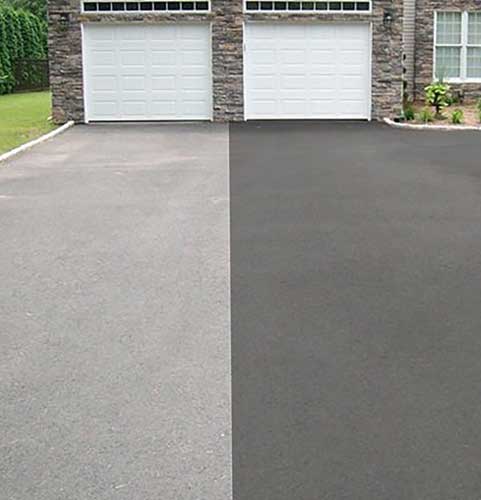Elevate Safety and Appeal: Angled Parking Lot Solutions with Asphalt Sealing
Warm Mix Asphalt: A Lasting Solution for Sidewalk
Warm Mix Asphalt (HMA) has emerged as a leading lasting choice for sidewalk services, offering a myriad of ingenious technologies and environmental advantages. As the demand for eco-friendly building practices expands, exploring the subtleties of HMA's sustainability can provide useful insights into the future of sidewalk remedies.
Environmental Benefits of Warm Mix Asphalt

In Addition, Hot Mix Asphalt helps to minimize metropolitan warmth island effects. Its dark shade absorbs sunshine, decreasing the quantity of heat showed back right into the environment contrasted to lighter-colored pavements. This can reduce ambient temperature levels in urban locations, decreasing the demand for cooling and ultimately minimizing power consumption.
Additionally, Hot Mix Asphalt adds to boosted stormwater monitoring. Its permeable nature allows water to infiltrate the pavement and charge groundwater products, lowering runoff and the risk of flooding. These environmental benefits make Hot Mix Asphalt a sustainable choice for paving roads and highways.
Energy Efficiency in HMA Production
Is energy efficiency an important consider the manufacturing of Warm Mix Asphalt (HMA)? Definitely. Power plays a considerable duty in the manufacturing of HMA, influencing both expense and ecological sustainability. One key element of power performance in HMA manufacturing is making use of cozy mix asphalt (WMA) innovations (commercial parking lot paving). WMA permits for the blending and placement of asphalt at lower temperatures contrasted to typical warm mix asphalt, leading to minimized energy consumption throughout manufacturing. This process not just lowers fuel usage yet additionally reduces greenhouse gas discharges, making it a more environmentally pleasant choice.
In addition, improvements in plant technologies have actually caused more energy-efficient HMA manufacturing processes. Modern plants are made with functions like recycled asphalt sidewalk (RAP) processing capabilities, reliable burner systems, and boosted insulation, all adding to power savings. By maximizing energy use in HMA production, the sector can minimize its carbon impact while preserving premium pavement materials. Energy performance is, for that reason, an important consideration in guaranteeing the sustainability of Warm Mix Asphalt production.
Recyclability of Hot Mix Asphalt
The recyclability of Hot Mix Asphalt (HMA) is an essential aspect of its sustainability and lasting ecological impact. HMA is among one of the most recycled products in the United States, with over 100 million heaps of reclaimed asphalt pavement (RAP) being reused every year in brand-new sidewalk construction. Recycling HMA uses numerous ecological advantages, such as decreasing the requirement for virgin products, decreasing power consumption read more during production, and reducing the amount of waste sent to land fills.
The procedure of recycling HMA involves milling the existing pavement, squashing it right into smaller pieces, and blending it with brand-new accumulation and asphalt binder to create a recycled mix. On the whole, the recyclability of HMA plays a significant duty in advertising sustainable practices within the sidewalk market.

Long-Term Performance of HMA
Asphalt pavements demonstrate toughness and strength over an extensive duration, mirroring the lasting efficiency of Warm Mix Asphalt (HMA) The longevity of HMA can be attributed to its ability to withstand rush hour loads, extreme climate condition, and the impacts of aging. Research studies have actually shown that well-designed and appropriately built HMA pavements can last for twenty years or even more with routine maintenance. The key to optimizing the long-lasting efficiency of HMA hinges on utilizing premium products, complying with finest practices in building, and executing efficient maintenance strategies. Correct water drainage, regular assessments, and timely repair work are vital for protecting the structural honesty of HMA pavements with time. Additionally, advancements in HMA modern technology, such as making use of polymer-modified binders and warm mix asphalt, have actually better boosted the durability and long life of HMA sidewalks. By prioritizing top quality building and maintenance techniques, HMA remains to show itself as a cost-efficient and lasting option for resilient pavement framework.

HMA: Durability and Sustainability
Showing both sturdiness and sustainability, Warm Mix Asphalt (HMA) has actually ended up being a keystone in the building of long-lasting sidewalk infrastructures - commercial parking lot paving. HMA's sturdiness stems from its capability to endure hefty loads, extreme weather, and high traffic quantities, making it a dependable selection for streets, freeways, and airport runways. The make-up of HMA, which usually consists of aggregates, binder, and filler, plays a crucial reference function in enhancing its durability and resistance to tear and use
In addition, HMA's sustainability lies in its recyclability and energy-efficient manufacturing procedure. The ability to recycle reclaimed asphalt sidewalk (RAP) in new HMA combinations decreases the need for virgin products and lessens the ecological influence of pavement construction and upkeep. Furthermore, the energy efficiency of producing HMA hinges on its lower blending temperatures compared to various other pavement products, resulting in lowered power usage and greenhouse gas more helpful hints discharges.
Final Thought
In verdict, warm mix asphalt (HMA) offers a lasting service for pavement with its ecologically pleasant features. HMA's recyclability, energy efficiency in manufacturing, and long-lasting durability make it an environmentally friendly choice for roadway building and construction.
HMA is one of the most recycled products in the United States, with over 100 million heaps of recovered asphalt pavement (RAP) being reused yearly in new sidewalk building.The process of reusing HMA entails grating the existing pavement, squashing it right into smaller sized items, and mixing it with new accumulation and asphalt binder to develop a recycled mix.Asphalt pavements show sturdiness and durability over an extensive period, reflecting the long-lasting efficiency of Warm Mix Asphalt (HMA) Additionally, innovations in HMA innovation, such as the usage of polymer-modified binders and warm mix asphalt, have actually even more boosted the sturdiness and longevity of HMA pavements. The ability to recycle recovered asphalt sidewalk (RAP) in new HMA mixtures minimizes the demand for virgin products and minimizes the ecological influence of pavement building and maintenance.